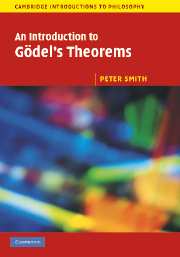Book contents
- Frontmatter
- Contents
- Preface
- 1 What Gödel's Theorems say
- 2 Decidability and enumerability
- 3 Axiomatized formal theories
- 4 Capturing numerical properties
- 5 The truths of arithmetic
- 6 Sufficiently strong arithmetics
- 7 Interlude: Taking stock
- 8 Two formalized arithmetics
- 9 What Q can prove
- 10 First-order Peano Arithmetic
- 11 Primitive recursive functions
- 12 Capturing p.r. functions
- 13 Q is p.r. adequate
- 14 Interlude: A very little about Principia
- 15 The arithmetization of syntax
- 16 PA is incomplete
- 17 Gödel's First Theorem
- 18 Interlude: About the First Theorem
- 19 Strengthening the First Theorem
- 20 The Diagonalization Lemma
- 21 Using the Diagonalization Lemma
- 22 Second-order arithmetics
- 23 Interlude: Incompleteness and Isaacson's conjecture
- 24 Gödel's Second Theorem for PA
- 25 The derivability conditions
- 26 Deriving the derivability conditions
- 27 Reflections
- 28 Interlude: About the Second Theorem
- 29 µ-Recursive functions
- 30 Undecidability and incompleteness
- 31 Turing machines
- 32 Turing machines and recursiveness
- 33 Halting problems
- 34 The Church–Turing Thesis
- 35 Proving the Thesis?
- 36 Looking back
- Further reading
- Bibliography
- Index
14 - Interlude: A very little about Principia
Published online by Cambridge University Press: 05 June 2012
- Frontmatter
- Contents
- Preface
- 1 What Gödel's Theorems say
- 2 Decidability and enumerability
- 3 Axiomatized formal theories
- 4 Capturing numerical properties
- 5 The truths of arithmetic
- 6 Sufficiently strong arithmetics
- 7 Interlude: Taking stock
- 8 Two formalized arithmetics
- 9 What Q can prove
- 10 First-order Peano Arithmetic
- 11 Primitive recursive functions
- 12 Capturing p.r. functions
- 13 Q is p.r. adequate
- 14 Interlude: A very little about Principia
- 15 The arithmetization of syntax
- 16 PA is incomplete
- 17 Gödel's First Theorem
- 18 Interlude: About the First Theorem
- 19 Strengthening the First Theorem
- 20 The Diagonalization Lemma
- 21 Using the Diagonalization Lemma
- 22 Second-order arithmetics
- 23 Interlude: Incompleteness and Isaacson's conjecture
- 24 Gödel's Second Theorem for PA
- 25 The derivability conditions
- 26 Deriving the derivability conditions
- 27 Reflections
- 28 Interlude: About the Second Theorem
- 29 µ-Recursive functions
- 30 Undecidability and incompleteness
- 31 Turing machines
- 32 Turing machines and recursiveness
- 33 Halting problems
- 34 The Church–Turing Thesis
- 35 Proving the Thesis?
- 36 Looking back
- Further reading
- Bibliography
- Index
Summary
In the last Interlude, we gave a five-stage map of our route to Gödel's First Incompleteness Theorem. The first two stages we mentioned are now behind us. They involved (1) introducing the standard theories Q and PA, then (2) defining the p.r. functions and – the hard bit! – proving Q's p.r. adequacy. In order to do the hard bit, we have already used one elegant idea from Gödel's epoch-making 1931 paper, namely the β-function trick. But most of his proof is still ahead of us: at the end of this Interlude, we'll review the stages that remain.
But first, let's relax for a moment after our labours, and take a very short look at some of the scene-setting background. We'll say more about the historical context in a later Interlude (Chapter 28). But for now, we ought at least to say enough to explain the title of Gödel's great paper, ‘On formally undecidable propositions of Principia Mathematica and related systems I’.
Principia's logicism
As we noted in Section 10.8, Frege aimed in Grundgesetze der Arithmetik to reconstruct arithmetic on a secure footing by deducing it from logic plus definitions. But – in its original form – his overall logicist project flounders on Frege's fifth Basic Law, which leads to contradiction. And the fatal flaw that Russell exposed in Frege's system was not the only paradox to bedevil early treatments of the theory of classes.
Information
- Type
- Chapter
- Information
- An Introduction to Gödel's Theorems , pp. 118 - 123Publisher: Cambridge University PressPrint publication year: 2007
